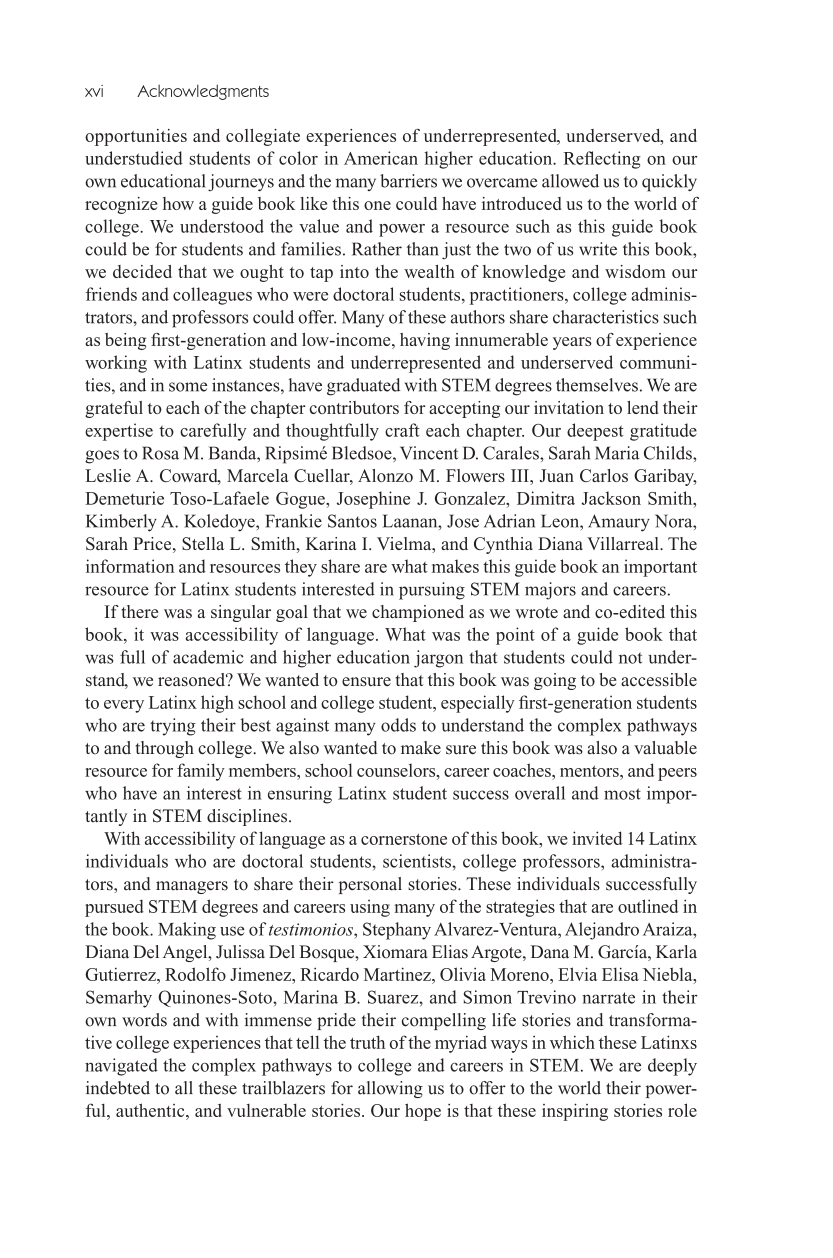xvi Acknowledgments
opportunities and collegiate experiences of underrepresented, underserved, and
understudied students of color in American higher education. Reflecting on our
own educational journeys and the many barriers we overcame allowed us to quickly
recognize how a guide book like this one could have introduced us to the world of
college. We understood the value and power a resource such as this guide book
could be for students and families. Rather than just the two of us write this book,
we decided that we ought to tap into the wealth of knowledge and wisdom our
friends and colleagues who were doctoral students, practitioners, college adminis-
trators, and professors could offer. Many of these authors share characteristics such
as being first-generation and low-income, having innumerable years of experience
working with Latinx students and underrepresented and underserved communi-
ties, and in some instances, have graduated with STEM degrees themselves. We are
grateful to each of the chapter contributors for accepting our invitation to lend their
expertise to carefully and thoughtfully craft each chapter. Our deepest gratitude
goes to Rosa M. Banda, Ripsimé Bledsoe, Vincent D. Carales, Sarah Maria Childs,
Leslie A. Coward, Marcela Cuellar, Alonzo M. Flowers III, Juan Carlos Garibay,
Demeturie Toso-Lafaele Gogue, Josephine J. Gonzalez, Dimitra Jackson Smith,
Kimberly A. Koledoye, Frankie Santos Laanan, Jose Adrian Leon, Amaury Nora,
Sarah Price, Stella L. Smith, Karina I. Vielma, and Cynthia Diana Villarreal. The
information and resources they share are what makes this guide book an important
resource for Latinx students interested in pursuing STEM majors and careers.
If there was a singular goal that we championed as we wrote and co-edited this
book, it was accessibility of language. What was the point of a guide book that
was full of academic and higher education jargon that students could not under-
stand, we reasoned? We wanted to ensure that this book was going to be accessible
to every Latinx high school and college student, especially first-generation students
who are trying their best against many odds to understand the complex pathways
to and through college. We also wanted to make sure this book was also a valuable
resource for family members, school counselors, career coaches, mentors, and peers
who have an interest in ensuring Latinx student success overall and most impor-
tantly in STEM disciplines.
With accessibility of language as a cornerstone of this book, we invited 14 Latinx
individuals who are doctoral students, scientists, college professors, administra-
tors, and managers to share their personal stories. These individuals successfully
pursued STEM degrees and careers using many of the strategies that are outlined in
the book. Making use of testimonios, Stephany Alvarez-Ventura, Alejandro Araiza,
Diana Del Angel, Julissa Del Bosque, Xiomara Elias Argote, Dana M. García, Karla
Gutierrez, Rodolfo Jimenez, Ricardo Martinez, Olivia Moreno, Elvia Elisa Niebla,
Semarhy Quinones-Soto, Marina B. Suarez, and Simon Trevino narrate in their
own words and with immense pride their compelling life stories and transforma-
tive college experiences that tell the truth of the myriad ways in which these Latinxs
navigated the complex pathways to college and careers in STEM. We are deeply
indebted to all these trailblazers for allowing us to offer to the world their power
ful, authentic, and vulnerable stories. Our hope is that these inspiring stories role









































































































































































































































































































